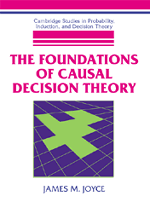Book contents
- Frontmatter
- Contents
- Preface
- Introduction: A Chance to Reconsider
- Chapter 1 Instrumental Rationality as Expected Utility Maximization
- Chapter 2 Decision Problems
- Chapter 3 Savage's Theory
- Chapter 4 Evidential Decision Theory
- Chapter 5 Causal Decision Theory
- Chapter 6 A General Theory of Conditional Beliefs
- Chapter 7 A Representation Theorem for Causal Decision Theory
- Chapter 8 Where Things Stand
- References
- Index
Chapter 4 - Evidential Decision Theory
Published online by Cambridge University Press: 25 July 2009
- Frontmatter
- Contents
- Preface
- Introduction: A Chance to Reconsider
- Chapter 1 Instrumental Rationality as Expected Utility Maximization
- Chapter 2 Decision Problems
- Chapter 3 Savage's Theory
- Chapter 4 Evidential Decision Theory
- Chapter 5 Causal Decision Theory
- Chapter 6 A General Theory of Conditional Beliefs
- Chapter 7 A Representation Theorem for Causal Decision Theory
- Chapter 8 Where Things Stand
- References
- Index
Summary
In this chapter we examine the evidential decision theory developed by Richard Jeffrey in The Logic of Decision. Jeffrey's theory has a number of significant advantages over Savage's. For example, it is able to account for the effects of an agent's actions on the probabilities of states of the world, and it provides a neat solution to the problem of small worlds. Even more important is the fact that the theory can be underwritten by a beautiful representation result, proved by the mathematician Ethan Bolker, that has almost none of the defects associated with Savage's theorem. This theorem does not presuppose the existence of either “constant acts” or “mitigators,” and all of its structure axioms can be reasonably interpreted as extendibility conditions.
We will learn in the next chapter that evidential decision theory cannot be used as a theory of rational choice since there are cases in which its prescriptions tell an agent to perform acts that are sure to leave her worse off come what may. This does not mean, however, that Jeffrey's theory is irrelevant to questions about what people should do. Indeed, I shall argue that any adequate account of rational action must be based on an underlying theory of valuing that has precisely the form Jeffrey proposes. The error in evidential decision theory, it turns out, is not found in the constraints it imposes on rational desire, but in a mistaken assumption about the epistemic standpoint from which decision makers should evaluate their acts.
- Type
- Chapter
- Information
- The Foundations of Causal Decision Theory , pp. 114 - 145Publisher: Cambridge University PressPrint publication year: 1999

